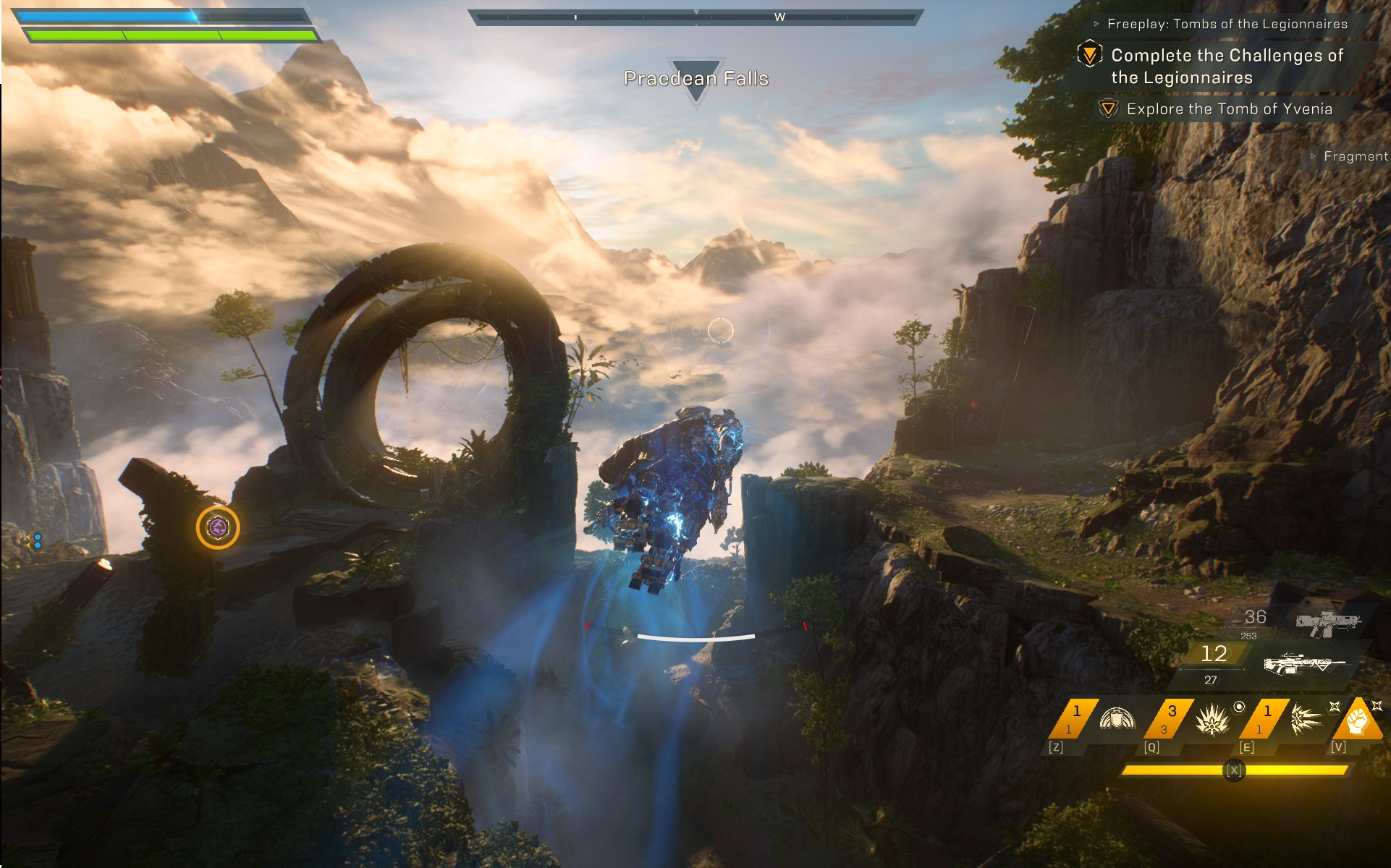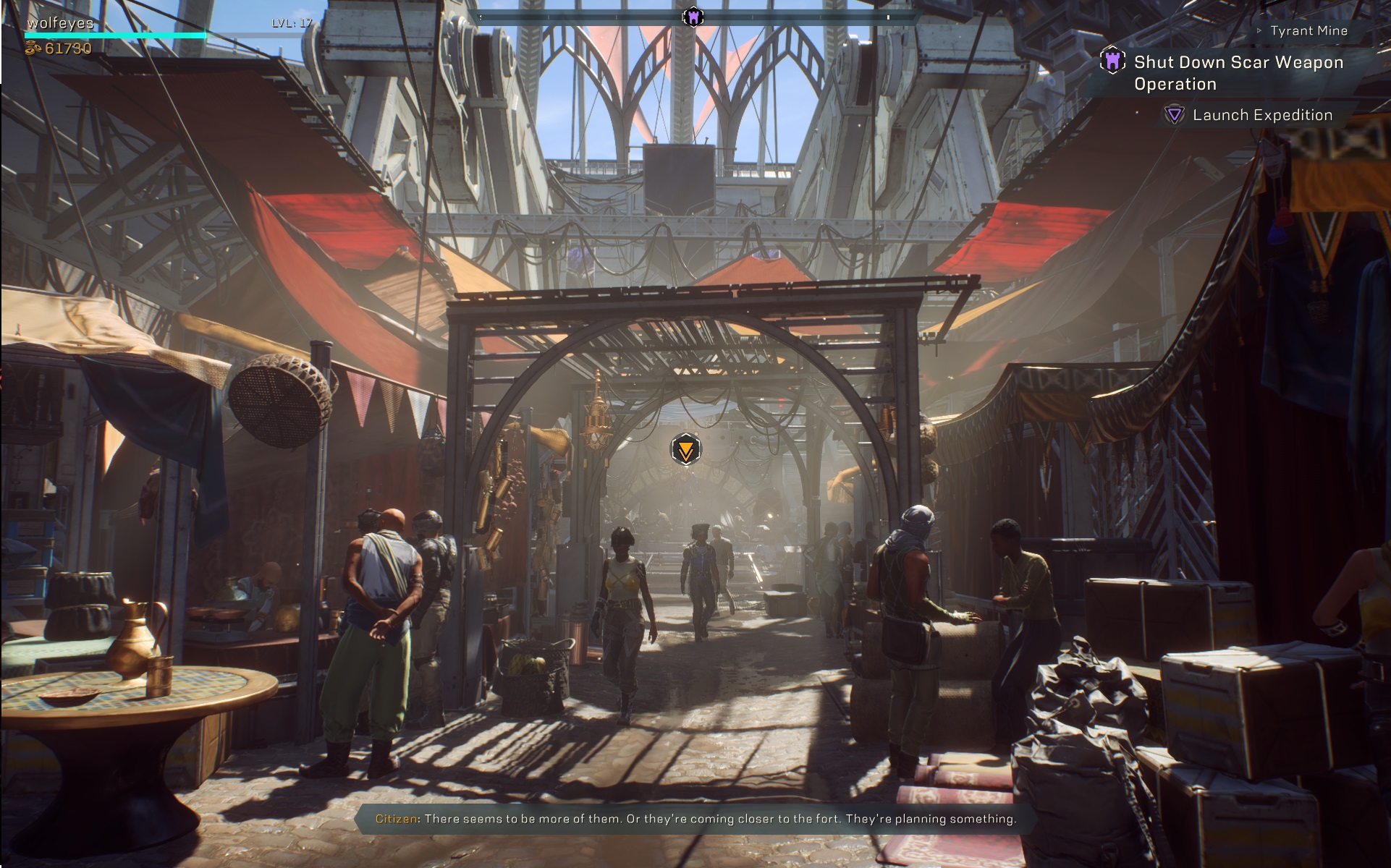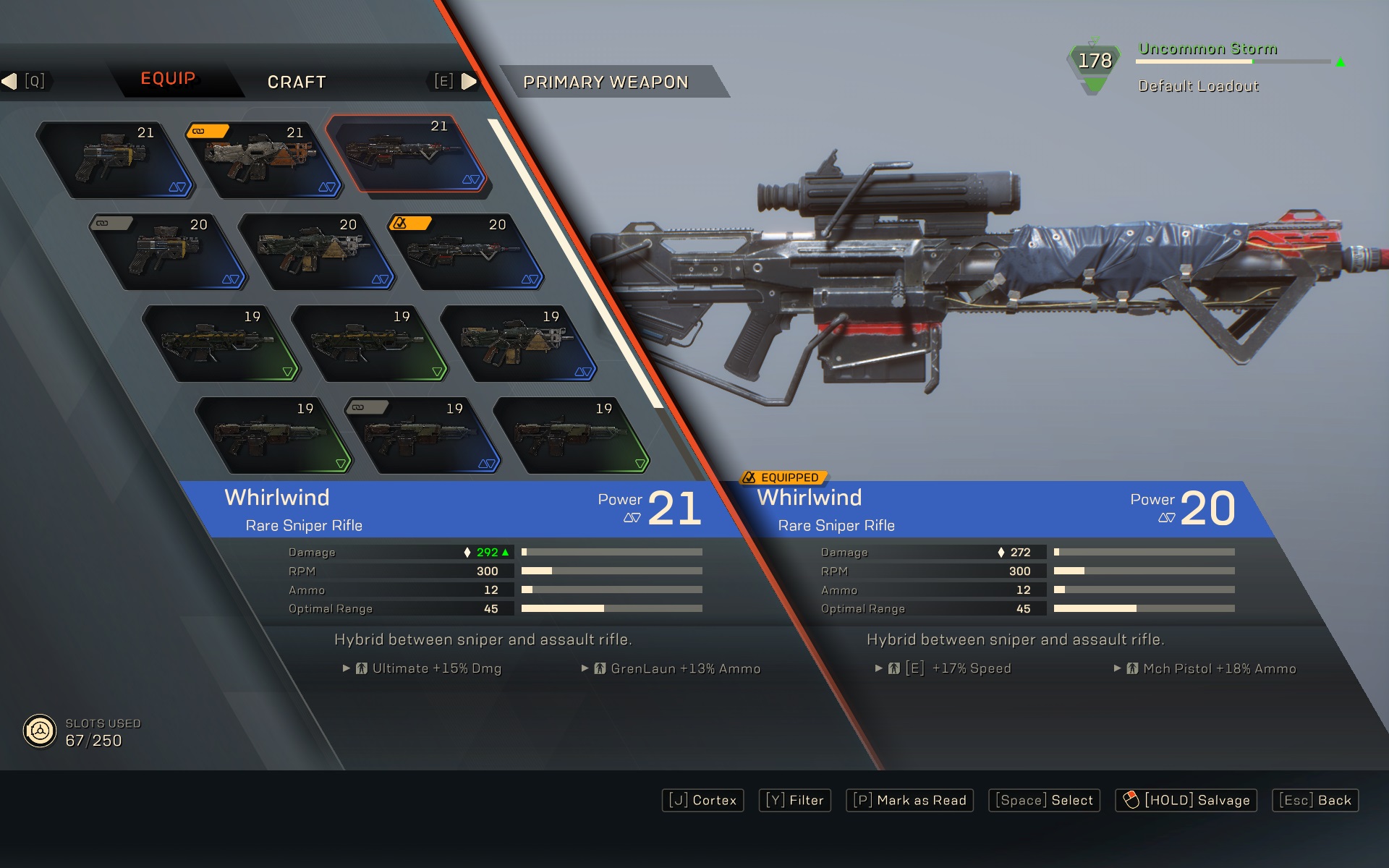
Anthem is the first attempt by Bioware (of Mass Effect and Dragon Age fame) to tap into the well of cash supposedly to be found in the “game as platform” trend that has grown over the last few years, with Destiny, Warframe and Fortnite as preeminent exemplars. After a botched demo weekend dampened fan expectations, the final game is here — and while it’s a lot better than the broken mess we saw a few weeks ago, it’s still very hard to recommend.
I delayed my review to evaluate the game’s progress after an enormous day-one patch. While it is always premature to judge a game meant to grow and evolve by how it is immediately after launch, there are serious problems here that anyone thinking of dropping the $60 or more on it should be aware of. Perhaps they’ll all be fixed eventually, but you better believe it’s going to take a while.
I’d estimate this is about half the game it’s clearly intended to be; it seems to me we must soon find out that most of Anthem, supposedly in development for five years or more, was scrapped not long ago and this shell substituted on short notice.
The basic idea of Anthem is that you, a “freelancer” who pilots a mechanized suit called a “javelin,” fly around a big, beautiful world and blast the hell out of anything with a red hostility indicator over its head, which in practice is damn near everything. Once you’re done, you collect your new guns and gadgets and head back to base to improve your javelin, take on new missions and so on.
If it sounds familiar, it’s basically an extremely shiny version of Diablo, which established this gameplay loop more than 20 years ago; its sequels and the innumerable imitators it spawned have refined the concept, bolstering it with MMO-style online integration, “seasons” of gameplay and, of course, the inevitable microtransactions. People play them simply because it’s fun to kill monsters and see your character grow more powerful.
 So Anthem is in good company, though of course for every success there are probably two or three failures and mediocre titles. Destiny has thrived in a way only because of its fluid and satisfying gunplay, while a game like Path of Exile leans on bulk, with skill trees and content one may never reach the ends of.
So Anthem is in good company, though of course for every success there are probably two or three failures and mediocre titles. Destiny has thrived in a way only because of its fluid and satisfying gunplay, while a game like Path of Exile leans on bulk, with skill trees and content one may never reach the ends of.
Anthem, on the other hand, lacks the charms of either. It is wildly short on content and its moment-to-moment gameplay, while competent and in some ways unique, rarely has you on the edge of your seat. It’s a very mixed bag of interesting concepts and disappointing execution, coupled with some truly baffling user experience issues.
I’ll cover the good parts first: the basics of flying around and shooting guys are for the most part solid. There’s a good variety of weapons, from hand cannons to shotguns and sniper rifles, with meaningful variations within those groups (though they usually boil down to rate of fire). You feel very cool during engagements, picking off enemies, dodging behind cover, flying to a new vantage point and so on.
Each of the four javelins has a good pile of themed special abilities that significantly affect how you play; for instance, the Storm starts out with (basically) non-damaging ice shards that freeze enemies, setting them up for a damaging combo from its lightning strike — but soon you can swap those out for fiery explosions and a charge-up blast of cold, and so on. The synergies are somewhat limited in that some abilities clearly only work with some others, but there’s fun to be had experimenting. I played with three of the four javelins available (more to come, apparently) and they were all very distinct styles.

Damn.
The graphics really are lovely, from the future-past desert chic of Fort Tarsis to the lush jungle cliffs of the world you’ll be exploring. The light and landscapes are beautiful, and the character models are, too. Firefights look chaotic and splashy, which they are. There are also lots of customization options, in terms of colors and materials anyway — there’s a puzzling lack of cosmetics to buy with in-game or real currency; only two or three are available right now.
Unfortunately, that’s pretty much the extent of what Anthem gets right — and to be clear, it really can be fun when you’re actually in the middle of a firefight, blasting away, doing combos with friends, taking on hordes of bad guys. The rest is pretty much a mess. Here’s the greatest hits of how Anthem fails to operate, to respect the player’s time and, generally speaking, to be a good game.
First and perhaps most egregious, the load screens are frequent and long. I timed it at more than five minutes from launch, and at least three or four different load screens, before I could actually play the game.

Get ready for a lot of this! And incidentally, many fire attacks don’t actually set up combos.
A long load time to bring up a huge world like Anthem’s I can understand. But load times to enter the screen where you change your gear? Load screens when you enter a small cave from the map? A load screen when you stray too far from your teammates and have to be teleported to them? A load screen when you finish a mission, then another before you can return to base — and another before you can equip your new gun? Oh my god!
This is compounded by a sluggish and over-complicated UI that somehow manages to show both too much and not enough, while inconsistent keys and interaction elements keep you guessing as to whether you need to press F or space or escape to go forward, hit or hold escape to go back, use Q or E to go through submenus or if you have to escape out to find what you’re looking for.
Equipment and abilities are mystifyingly under-explained: no terms like “+15% gear speed” or “+/-10% shield time” are explained anywhere in the tutorial, documentation or character screen — because there is no character screen! For a game that depends hugely on stats and getting an overall feel for your build and gear, you have to visit five or six screens to get a sense of what you have equipped, its bonuses (if comprehensible) and whether you have anything better to use. Even core game systems like the “primer” and “detonator” abilities are only cursorily referenced, by cryptic icons or throwaway text. The original Diablo did it better, to say nothing of Anthem’s competition at the AAA level.
Navigating these menus and systems is doubly hard because you must do so not by just hitting a key, but by traveling at walking speed through the beautiful but impractical Fort Tarsis. It took a full 30 seconds for me to walk from my suit (the only place where you can launch missions) to a quest giver. And when you start the game, you start in a basement from which you have to walk 20 seconds to get to your suit! Are you kidding me?

A common sight.
Even when you’re doing what the game does best, zooming around and getting in firefights, there’s a disturbing lack of mission variety. Almost without exception you’ll fly to a little arena — some ruins or a base of some kind — and are immediately alerted of enemies in the area. They warp in at a convenient distance, often while you watch, and attack while you stand near a gadget (to advance a progress bar) or collect pieces to bring back. Some more powerful guys warp in and you shoot them. Fly to the next arena, rinse and repeat.
Sure, you could say “well it’s a shooter, what do you expect?” I expect more than that! Where are the aerial chases the intro leads you to believe exist? Enemies all either stand on the ground or hover just above it. They don’t clamber on the walls, get to the top of towers, shoot down on you from cliffs, climb trees, build gun emplacements. You don’t defend a moving target like the “Striders” (obviously AT-ATs) you supposedly travel in; bridges and buildings don’t crumble or explode; you don’t chase a bad guy into a big cave (or if you do, there’s a loading screen); the “boss-type” enemies are often just regular guys with more life or shields that recharge in the time it takes you to reload. Where are the enemy javelins? The enemy Striders? Ninety percent of what you kill will be ground-bound grunts taken down in a flash. For a game in which movement is emphasized and enjoyable, combat involves very little of it.
The campaign, which is surprisingly well acted but forgettable, seems like it was tacked on in a hurry. Amazingly, a major cutscene details a much more interesting story, in which a major city is overrun and destroyed and only a few survive. It struck me at the time that this might have been the original campaign and starting mission, after which you are logically relegated to the nearby Fort Tarsis and forced to fight for scraps. Instead you have a series of samey missions with voice-overs telling you what’s happening while you stand there and watch progress bars fill up.
 At one point you are presented with four ancient tombs to track down, only to find that these amazing tombs aren’t missions but simply checklists of basic game activities like opening 15 treasure chests, killing 50 enemies with melee and so on. At a point, increasing these numbers was literally the only “mission” I had available in the game. And when I tried to join other people’s missions to accomplish these chores, half the time they were broken or already finished. Even trying to quit these missions rarely worked! (Some of these bugs and issues have been mitigated by patches, but not all.)
At one point you are presented with four ancient tombs to track down, only to find that these amazing tombs aren’t missions but simply checklists of basic game activities like opening 15 treasure chests, killing 50 enemies with melee and so on. At a point, increasing these numbers was literally the only “mission” I had available in the game. And when I tried to join other people’s missions to accomplish these chores, half the time they were broken or already finished. Even trying to quit these missions rarely worked! (Some of these bugs and issues have been mitigated by patches, but not all.)
Spoiler warning! What do you think is in the tombs? A taxing dungeon full of traps, monsters and ancient treasure? Nope! Literally just a tiny, empty room. And yes, there’s a loading screen — both in and out.
Oh, and because many of the missions are difficult or tedious to do solo, you’ll want to team up — except if you’re slow to load, the mission will commence without you and you’ll miss the VO. Whoops! And by the way, if you just want to test out a new gun or power, you’ll have to join a multiplayer “freeplay” session to do it, which is another handful of loading screens. I’m not even going to get into the failings of the multiplayer. Because you can’t communicate it’s basically like playing with bots. By the way, there’s no PvP, so forget about skirmishing with your friends or randoms.
 Even the loot you get is frustratingly low-quality and unimaginative. Every gun or component is a standard model almost always with just slightly better damage than the last one you found, and perhaps a stat bonus. But the stat bonuses are boring and often nonsensical: do I really want an assault rifle that gives me 10 percent better damage with heavy pistols?
Even the loot you get is frustratingly low-quality and unimaginative. Every gun or component is a standard model almost always with just slightly better damage than the last one you found, and perhaps a stat bonus. But the stat bonuses are boring and often nonsensical: do I really want an assault rifle that gives me 10 percent better damage with heavy pistols?
Where’s the fun? For comparison when I was playing Diablo III recently I found a pair of leg armor early on that produced a powerful poison cloud whenever I was touching three or more enemies. Suddenly I played differently, rushing into crowds of monsters and leaping out, then immobilizing them while their life ticked down. I changed out my weapons, focused on physical defense, poison buffs… all because of a pair of pants!
I’ve encountered nothing like that in 25 hours of Anthem. Every new power and gun is the same as the old one but with a higher number. Where’s the lightning bolt that also sets people on fire, or the plasma blast that always knocks down flying guys? The pistol that does double damage against one class of enemy, the sniper rifle that automatically chambers a new round instantly in one out of five shots?
You do eventually find some “Masterwork” items that have unique qualities, but even these are compromised by the fact that their stats are completely random (such as a bonus to the wrong damage type), necessitating a grind to make or find them over and over until you get one with bonuses that make sense.
So much of Anthem seems like it’s just missing. The campaign is half there; the controls and UI are half there; the loot is half there. The multiplayer is half there. Everything lacks a critical piece that makes it more than basically functional, and considering the game’s highly polished competition, this is inexplicable and inexcusable. I find it hard to believe this was in the works for five years when such elementary aspects like a character screen and working item descriptions aren’t included at launch.
It’s more than possible that with perhaps half a year of work the Bioware team — which seems to be painfully aware of the game’s shortcomings, if their responses to detailed litanies of complaints on the game’s subreddit are any indication — could make this game worth the price of entry. But right now I couldn’t recommend it to anybody in good conscience, and I’m disappointed that a developer that’s created some of my favorite games dropped the ball so badly.
It’s too bad, because I feel the pull of the game, the basic chaotic fun at the heart of any good looter-shooter, because I feel like this can’t really be it. This can’t really be all my abilities, right? This can’t be every weapon? I liked Anthem when it was at its best, but that was so very little of the time I spent in it, and it took so much effort and patience on my part to even make those moments a possibility. I’ll be checking back in with the game in the hopes that it makes a Destiny-esque turnaround, but for now I have to say Anthem suffers from a failure to launch.

